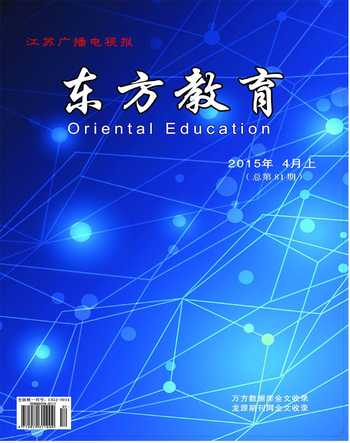The Guiding Role of Politeness Principle in Emotion Cultivation in English Teaching
2015-05-30张淑婷马媛萍
张淑婷 马媛萍
Abstract:This paper concentrates on the importance of politeness in emotion cultivation in English teaching. Politeness principles in the second language acquisition also need teachers to protect students self-esteem, give students a suitable evaluation and encourage their autonomous English learning.
1. Politeness principles in emotion cultivation in English teaching
There are two important reasons for teachers to obey politeness principles in English teaching. On one hand, teachers obey the politeness principles can influence students and to help them to understand the meaning of politeness principles deeply. Then,help them to use these principles and stimulate students interests to learn English and to use English to communicate in English class. On the other hand, politeness principles can improve the cooperative relationships between teachers and students to promote the efficiency of teaching and to improve the quality of teaching.
1.1 The role of strategy maxim in emotion cultivation.
In Leechs politeness principles, strategy principle is practical and is widely used. Language instruction is an initial part in daily life communication. People need to pay attention to politeness and strategies principles especially when they use dialing instructions. In English teaching classroom, the use of strategy criterion should be reflected in teachers language instruction. For example:
A: would you like to answer this question?
B: Could you read this to us?
C: Just have a try. I‘11 help you.
D: Could you possibly join in this activity, please?
E: Do you like to make dialogues?
We can see from these examples, when the teacher let the students to finish the task, the teachers use euphemistic methods to inquire and advise students to finish the task instead of tone, these kinds of language instruction methods give students the right to choose, it is also affirm students dominate position during the teaching process.
1.2Generosity maxim in emotion cultivation
Teachers and students are two completely different individuals, their social status and language level is different, and they are also play different roles in classroom teaching. Classroom teaching is an interaction process between the teachers and the students. Students participation and coordination is necessary for the teachers when they are teaching. Generally speaking, it is benefit to obey generosity maxim, it is helpful to cultivate students independent study ability. It is also can enhance the teachers friendliness to the students.
1.3 Appreciation maxim
There is a saying that compliment is like a shining sun which can enlighten the heart of human beings. Without compliment, human beings inner world will be lack of vitality. For this reason, to compliment others appropriately and appreciate others in a moderate way in our daily life will comfort others. It is also a good method to give others amazing expression and en efficient way to earn others trust. Every human being has respect, every human being desire to be paid attention to and to be trusted. Students also have these desires especially when they face the person that in their own age. In class, they expect to earn both teachers and classmates affirm. Teachers should try their best to satisfy the students these kinds of psychological needs.
1.4 Modesty Maxim in emotion cultivation
Teachers image and authority is set up by their solid and artistic teaching practices but not by their self-dramatizing gorgeous language. If the teacher just boast his or her advantages in classroom teaching in order to belittle the students. Then the teacher thinks he or she can use this way to show his or her authority to earn the students respects and praise. But these kinds of methods only get effect the opposite way that the teacher wishes. The students will feel how ridiculous the teachers are instead of enhance the teachers authority in their mind.
1.5 Agreement Maxim in emotion cultivation
In English classroom teaching, however, teachers teaching and the students learning is a unified unity. The teacher and the students are two independent individuals. Their social position and knowledge level is different; their role in classroom teaching is also different. to avoid conflict and divergence occurred during English teaching, as the organizer of teaching, the teacher can choose moderate language to remission class conflict, diminish division try their best to make sure both sides reach an agreement in classroom teaching interaction.
1.6 Sympathy Maxim in emotion cultivation.
So called sympathy maxim is to try ones best to diminish aversion to others and try to fortify the sympathy to others. In English teaching, teachers may encounter all kinds of troublesome. For example, the students dont finish their homework on time or ignore or even make the mistake again and again in the knowledge that the teacher drummed in. in the face of these annoying problem, more or less, the teacher may angry or even have the emotion of disgust. But senior high school students have a strong rebellious attitude in their age, if the teacher takes some tough attitudes to them or punish them severely will lead to adverse consequences. These factors will have a bad effect in classroom activities. All in all, nobody wants these phenomenons happened in the class. So the teacher should obey the sympathy maxim of politeness principle.
2. Conclusion
Teacher-student relationship and language classroom teaching have a kind of bilateral and interactive relation. Concerning affection can improve the quality and effect of language teaching. On the contrary, language teaching helps students develop positive and healthy affection. This shows that studying affective factors in class has great significance for both theory and practice of SLA.
References
[1] Leech, G .Principles of Pragmatics [M].London: Longman, 1983.
[2] Brown Penelope & Steven Levinson. Politeness: Some Universals in Language Usage [M], 1987;
[3] Clark, H. H., & Schunk, D. H. Polite responses to polite requests. Cognition
